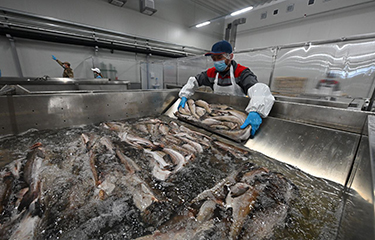The Russian government is extending restrictions on foreign investments in its seafood industry through amendments to existing legislation.
The Russian government already limits the size of foreign investments in certain seafood sectors, and is now planning expand the scope of those limits. The tightening of control comes as Russia has classified its seafood industry as critically important to national food security amid escalating global tensions in response to its invasion of Ukraine.
In late September, the State Duma – the lower chamber of the Russian Parliament – passed changes to current legislation creating rules for investment in the domestic seafood sector. Any purchase by a non-Russian of a more than 25 percent stake in a Russian company involved in fishing, processing, storage, or transportation of seafood – essentially any business operation involving seafood in any way – would be subject for approval by a government commission. Previously, this requirement only applied to fishing, leaving other parts of the industry – processing, storage, and support services – open to foreign investment.
Supporters of the bill have argued that foreign ownership in seafood businesses could negatively affect Russia’s interests in the industry, with owners potentially not prioritizing Russia's food security or national interest.
The law now faces a vote in the Federation Council – the upper chamber of parliament – and if approved there, it will face approval or rejection from Russian President Vladimir Putin. Most legislation that makes its past the Duma is approved, as Putin's party holds control of parliament.
If it becomes law, within a year, foreign owners with a stake larger than 25 percent in any seafood-related company operating in Russia must either receive approval from the commission or lower their ownership stake below 25 percent. Those not in compliance after one year of the law going into effect will face a suit from the Russian Federal Antitrust Service (FAS) that could force them to give up any decision-making power in their company’s operations.
The legislation represents a reversal from Russia’s previous stance on foreign ownership. In 2019, Russia’s government considered allowing more foreign investments in seafood industry, with Shestakov saying at the 2019 Global Fishery Forum the country could benefit from a capital infusion.
“Why don’t we let them in, or let them in only by an approval of a government commission? Foreign companies face no restrictions in the agriculture segment as well as in fish processing, so why do they in fishing?” he said at the time. “Is there any threat to national security if we allowed foreign companies to buy quotas to fish?”
Russia previously tightened rules around foreign ownership in its seafood sector in 2014, following Russia’s hostile annexation of the Crimean Peninsula, which resulted in international sanctions. Prior to that, foreign investors had been allowed to own up to 50 percent of a fishing company. The law passed in 2014 made that ownership level subject to approval, and in the summer of 2021, the law was further strengthened to reduce foreign ownership stakes in fishing companies to 25 percent.
Russia also completely banned all imports of seafood from a number of countries in 2014, and to make up for the lost trade, the government began a series of programs to strengthen the country's domestic seafood sector. Aggressive investment quota incentives gave Russian companies additional resources if they built new fishing vessels or processing facilities in Russia. However, the requirement production occur solely in Russia has resulted in complications and delays that have put the program at risk.
Russia’s invasion of Ukraine has caused a ripple effect in the global seafood market, and the European Union, United Kingdom, and U.S. all responded with sanctions that have scrambled the seafood industry's traditional trading patterns.
In response, Russia recently revised its fishery strategy with a view toward enhancing the nation’s food security and increasing food exports by achieving higher domestic growth rates, but problems with that strategy have also emerged.
Photo courtesy of the Russian Fishery Company







